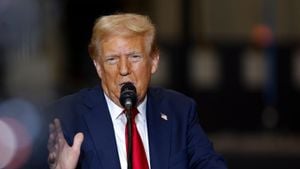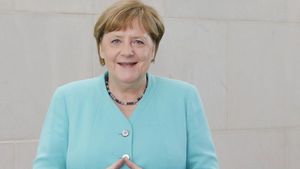The recent issuance of arrest warrants by the International Criminal Court (ICC) for Israeli Prime Minister Benjamin Netanyahu and former defense minister Yoav Gallant has ignited heated international controversy, intensifying the already fraught tensions surrounding the Israeli-Palestinian conflict. The ICC's warrants stem from allegations of war crimes related to Israel's military operations against Hamas, particularly during the devastating conflict sparked by the horrific attacks on October 7, 2023, which saw nearly 1,200 people killed, including many quickly becoming casualties of war.
Netanyahu has fervently condemned the ICC's ruling, labeling it as "ridiculous, absurd and baseless," affirming his position as he navigates the political turbulence both domestically and internationally. Israeli officials assert this decision reflects the Court's apparent bias against Israel, claiming it disregards the complex reality of the Israeli-Palestinian conflict. Critics of the ICC argue it has historically exhibited anti-Israel sentiment, undermining its credibility.
Support for Netanyahu's stance is palpable within the United States, where bipartisan political backing seeks to counteract the ICC's actions vigorously. Prominent figures, including Senator Lindsey Graham, have declared intentions to impose severe sanctions on any Western ally enforcing these arrest warrants, asserting such actions will be met with substantial economic repercussions. Graham's rhetoric starkly communicated, "if you are going to help the ICC as a nation and force the arrest warrant, I will put sanctions on you as a nation.”
This sentiment is echoed by other U.S. lawmakers who describe the ICC as nothing more than a "kangaroo court," with Senator Tom Cotton referring to its chief prosecutor as “a deranged fanatic.” Cotton's inflammatory comments included suggestions of military reprisals against the ICC if those warrants led to detention of Israeli leaders.
The ICC itself has come under scrutiny not just for its recent actions, but also for the perception of its legitimacy and impartiality. A substantial argument has emerged from critics who suggest the ICC's warrants equate Israeli leaders with those of Hamas, vastly simplifying the complicated moral and legal landscapes dominating international law. Such comparisons have provoked indignation from Israeli leaders, who firmly reject the bond, arguing it undermines the notion of distinct accountability based on actions.
Adding to this scenario, there are growing movements within the Israeli government aimed at mobilizing international and domestic opposition against the ICC. Israeli legal scholars and politicians propose various strategies, including leveraging diplomatic ties to persuade countries to withdraw from the Rome Statute, which enacted the ICC's establishment. According to some analysts, distancing Israel from formal cooperation with such international bodies could potentially reshape responses to its leaders.
On the domestic front, the Israeli administration faces pressure to bolster the nation’s legal defenses. Experts recommend drafting comprehensive legal rebuttals to the claims posed by the ICC, highlighting the potential injustices underpinning the charges. It is suggested Israel must refocus its energies on strengthening its legal frameworks rather than engaging counterproductive confrontations with international entities.
The ramifications of these arrest warrants extend beyond courtroom dynamics; they touch the very fabric of international relations and the challenging task of maintaining alliances. Countries such as Canada, Britain, and France are caught between their legal obligations and the stronger influence of U.S. political interests, which typically align with Israel's narratives. Hence, the political climate surrounding the ICC and its actions are set against the broader backdrop of geopolitical maneuvering.
Meanwhile, former President Donald Trump, responding to ICC developments, outlined intentions to press for sanctions against ICC officials following the trend established during his previous presidency, where similar strategies were employed to thwart attempts at international accountability for U.S. actions abroad. Many argue this deepens the already significant rift between the U.S. and international legal norms framed around accountability.
The ICC's contention over the balance of power, law, and international relations has resurfaced broader discussions about the nature of universal jurisdiction and the practical reality of geopolitical pressures. With threats of military action resurfacing as plausible consequences for ICC actions, the narrative evolves from one of legal indictments to potential geopolitical crises—advanced by segments of U.S. legislature determined to redefine the conversation around international law enforcement.
Attention now shifts to how these simultaneous challenges will determine not only the future of the ICC but also the delicate balance of international relations as Israel navigates its path post-warrant. Will these arrests catalyze greater unity or division among allies? Will they prompt escalated hostilities, particularly at regional levels?
The events surrounding these arrest warrants could have lasting impacts, not simply on Netanyahu's administration, but on the broader scope of international legal proceedings when addressing war crimes. With stakes progressively high, the world watches closely to see how political posturing and international law intertwine against the backdrop of this long-standing and complex conflict.



